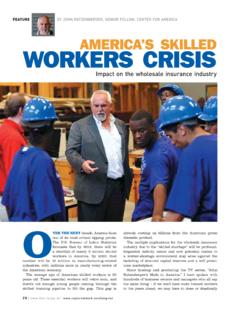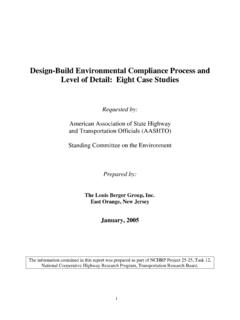Transcription of Celebrating The Genius of Wolf Wolfensberger - Inclusion …
1 Running head: Celebrating WOLF Wolfensberger . Celebrating The Genius of Wolf Wolfensberger john O'Brien Lithonia, Georgia Address correspondence to: john O'Brien Celebrating WOLF Wolfensberger 2. For 50 years people with intellectual disabilities, their families and their allies have participated in a profound, if incomplete, shift in how their place in society is valued and understood, in the ways their possibilities for development and contribution can be imagined, and in the means available to assist them to lead good lives. As the persistent shadows of eugenics and social darwinism have diminished and practices of segregation and bureaucratic control have increasingly been supplanted, it has become possible to meet growing numbers of people with disabilities who live good lives in ordinary communities.
2 Until his death on 27. February 2011, Wolf Wolfensberger poured his Genius into the entire half-century of this shift. Exceptional Ability A good case can be made for Wolf's Genius in the contemporary sense of exceptional ability. The scope of his thinking can't be captured at less than book length. Beginning in 1958. and most recently (though not finally) in the month of his death ( Wolfensberger , 2011) he produced nearly 300 publications ranging ranging from experimental studies of learning to a book collecting his writing on theology and disability (Gavinta and Coulter, 2001). Fortunately, David Race (2003) has surveyed much of his thought in a beautifully edited and annotated collection of readings which earned Wolf's enthusiastic endorsement. This body of written work shows Wolf's intellectual gifts of analysis, theory building, and strategic thinking (he held the US Chess Federation rank of Chess Expert, one grade below National Master): he articulated the principle of normalization in operational detail and then refined it into the similarly operationalized theory of social role valorization; he presented and refined a set of principles and specifications for designing, implementing and governing a comprehensive system of community services; he developed a schema for understanding and developing protection and 3 June 2011.
3 Celebrating WOLF Wolfensberger 3. advocacy and redefining the role of voluntary associations; he produced a closely argued case for a growing societal tendency toward deathmaking (systematic destruction) of vulnerable people and a systematic approach to support moral behavior in the face of social disfunction and destructiveness ( Wolfensberger , 1992). In each of these efforts he looked for and continually refined his presentation of fundamental principles and the rigor and clarity with which their implications were deduced and presented. He demanded disciplined review of the extent and effects of their implementation and continually revised the details of their presentation. Wolf was a charismatic presence with a great love of life. He was a gifted and demanding teacher (thanks to the Minnesota Governor's Council on Developmental Disabilities, it's possible to view Wolf and his long time associate Susan Thomas teaching two one day workshops at ).
4 He intentionally built networks of people in the US, Canada, the UK, Australia, New Zealand and Norway whom he considered potential leaders by engaging them in intensive and rigorous workshops, recruiting them into team experiences, and assigning them responsibility for presenting and writing about the foundations, content, and implications of the theories that he judged would best respond to the real needs of marginalized and vulnerable people. Especially in the 1970's and 80's, this strategy multiplied the influence of his ideas as more and more members of this network moved into positions of authority in developmental disabilities services. Few agreed with all of Wolf's positions and practices; many more were moved by moments of clarity generated by his person and his ideas.
5 3 June 2011. Celebrating WOLF Wolfensberger 4. Generative Power This capacity to move people brings me to the less common sense of Genius that I want to celebrate in Wolf. In classical times the word Genius was closer to its root, which means to generate, and refers to an individual guiding spirit, a unique pattern of sensibilities and powers that constitutes a person's way of relating to the world. Wolf identifies important elements of this pattern in himself as he reflects on his doctoral study in the first program dedicated to training research psychologists in what was then labeled mental deficiency ( Wolfensberger , 2008). My mentors seemed to think that I was a little on the crazy side, and in a sense they were right, except it was a craziness that protected me from surrendering to the innumerable normative crazinesses of a professional or service practice nature.
6 At the 2004 Peabody reunion, my advisor admitted that the faculty would not have rated me as one of their more promising students. However, I stayed in the field, was indefatigable in addressing real-life challenges there, and worked full-time even after my supposed retirement, the same as my friend and mentor Gunnar Dybwad had done. Also, I formed extensive informal personal involvements with retarded people, some lasting for decades until death parted us. (p. 77). A heart open to the lives of people with developmental disabilities gave him purpose and a lifetime of insights. From his first encounter with institutions as a psychology intern, he was outraged at the way people were treated and by the moral complacency of those responsible for their management. Experience convinced him that communicating trust and high expectations reliably elicited growth, even among those he met and served in the most violent and degraded 3 June 2011.
7 Celebrating WOLF Wolfensberger 5. environments ( Wolfensberger , 1999). Two summers as a psychologist at Muscatatuck State School during graduate study bonded me to a commitment to mentally retarded people for the rest of my life ( Wolfensberger , 2008, p. 67). This commitment channeled Wolf's natural gifts of intellect and power of will into the discipline that sustained more than 50 years of hard work engaged with the real life challenges in living and supporting good lives in a society that devalues developmentally disabled people. In the service of this bond, he developed the critical faculties and self-possession to hold and vigorously communicate positions that sometimes imposed serious personal cost and more than occasionally led others with differing perspectives to mark him as at least mildly crazy (or severely irritating).
8 A Field Breaking Open With a new doctorate, Wolf entered a field in the earliest stages of reformation after a long period of inertia that left the worst practices of the eugenic era grinding mindlessly and soullessly on in institutions. Outside institutions, parent leaders built local voluntary services and created practices based on a sense of their son's and daughter's potential, influenced increased state and federal investment, shaped recognition of the rights of people with mental retardation to education and to humane treatment, and began to attract the attention of lawyers concerned with civil rights. The efforts of national leaders including Elizabeth Boggs and Gunnar and Rosemary Dybwad were accelerated by President Kennedy's appointment of the President's Panel on Mental Retardation in response to the relentless advocacy of his sister, Eunice Kennedy Shriver.
9 Progressive post-war policies in Scandinavia and parts of Britain defined a new and positive policy foundation and the related practices set a new standard of service and demonstrated new possibilities. Allan Roeher created Canada's National Institute on Mental Retardation as a 3 June 2011. Celebrating WOLF Wolfensberger 6. national center to stimulate change. Burton Blatt courageously broke the code of professional silence, exposed the institutional horror of Christmas in Purgatory in Look magazine and lent his gifts of heart, mind and political skill to energizing the professions for genuine reform. There were plenty of opportunities to learn and Wolf was open to having his mind repeatedly blown (as he put it) by the gaps between demonstrated European possibility and even the best North American practice.
10 Following post-doctoral study with Jack Tizard in England and a tour of Swedish and Danish services, his publications take a sharp and final turn away from such topics as the oral vocabularies of severely subnormal patients (1963) and move into the dissemination of lessons from Europe (1964) and a stream of papers and books that strongly influenced the development of community services for people with developmental disabilities over the next 20 years. A Distinctive Way of Knowing This turn marks a decisive shift from a form of research that depends on experimental manipulation to the disciplined way of knowing that Wolf developed through the rest of his life. This form of research combines direct observation and documentation of the real life conditions of people with developmental disabilities in many different circumstances (in addition to voluminous and meticulously detailed four-color-coded notes, he took thousands of slides of developmentally disabled people's life circumstances, studied them with care, and used them to powerful effect in teaching); historical retrieval of the portrayal, management, and assistance of people with disabilities (he amassed a huge collection of relevant historic texts, documents and images, including a history of institutions through postcards); and broad search for nuggets of 3 June 2011.







